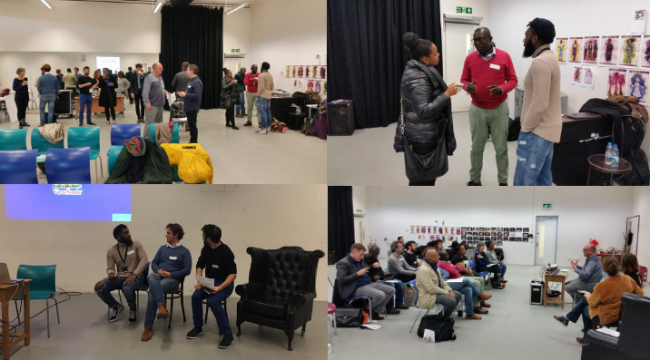Languages in the Creative Economy: On Equality, Inequality and Unequality…

On Friday 30 November, a diverse group of theatre-makers, performers and academics met in a rehearsal room at the Birmingham REP theatre to think about the relationship between creativity and multilingualism in the context of the performing arts. The atmosphere was informal and unstructured – a rather different dynamic from most academic events, and one which certainly created a space for stories to be told, voices heard and dialogues staged.
It would be hard to summarise any single contribution, let alone the shape of the whole day, and many of the lessons learned feel more intuitive than scholarly or practical. Certainly there were some anxieties: that the institutional structures of the creative arts sometimes militate against multilingual performances and the presence of foreign languages in our cultural life; and that the commercial structures that underpin so much theatre, music-making and performance tend to play to what seems safe, conventional and bankable. Yet there was optimism and inspiration too, especially when performers themselves shared their experiences of working with, through or even against the system. And there were provocations too, with some speakers asking how global, multicultural or multilingual Britain really was?
It was, perhaps, that sense of provocation, rather than any comfortable and unreflective celebration of multilingual creativity, that has stayed with me since. And looking back, it feeds into a theme of the often unequal relationships between language, speakers and communities that did seem to run through many of the discussions and interventions on the day. Beginning the first panel, on ‘multilingual performance in practice’, Peter Wynne-Willson discussed his bilingual, cross-cultural youth drama, Orange Polar Bear. The result of workshops with young people, and performed in both South Korea and the United Kingdom, this appears to bring together two languages and two cultures in creative harmony, yet as Peter pointed out, the understanding that British audiences are likely to have of Korean culture differs vastly from how Koreans relate to the English language.
This asymmetry can’t be avoided or ignored; it’s built into the collaboration itself, and shapes both cultural production and audience response. Similar inequalities obtain in other multicultural, multilingual contexts – how do we value so-called ‘home’ or ‘community’ languages in or creative lives? What happens when we bring foreign theatre companies to the UK, and do they unsettle our assumption of British monolingualism and monoculturalism, or do they reinforce the idea that language and nation map neatly onto each other?
A lot of my own multilingual life is rooted in a search for belonging and understanding, and that search has taken me around the world and a long way from ‘home’. And it is a life that has been made possible by a lot of privilege – financial, educational and cultural. Yet on this day, I found a whole host of multilingual encounters and inspiration on my doorstep, and whilst I often found myself on the outside of some in jokes, and frowning with ignorance when others were laughing at some piece of creative wordplay that brought together Arabic, Jamaican Patois, Brummie and Cockney, it was above all a sense of generosity, spontaneity and the willingness to share our very different experience that made for an abiding sense of community.
Philip Ross Bullock is Professor of Russian Literature and Music at the University of Oxford and Senior Researcher on our 4th strand: Languages in the Creative Economy.